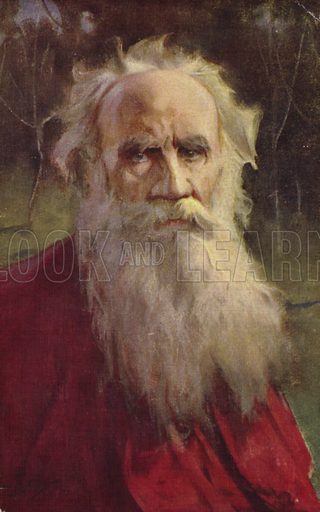
|
For more articles like this go to the Look and Learn articles website. |

“Tell her to go away.” The old man, clothed in the garb of a simple peasant, who lay dying of pneumonia on a bench in the waiting room of the railway station of Astapovo, looked at the tearful face of his wife at the window, and then turned his head away. “I do not wish to see her.”
Outside, the reporters and photographers jostled with each other to obtain a glimpse through the window of the last hours of Leo Tolstoy, whose novel, War and Peace, is recognised today as one of the greatest novels ever written.
The story of Leo Tolstoy, the Russian count who renounced everything he once held dear, is the story of a man who tried to achieve the impossible. He had come to believe in voluntary poverty and wished to give his lands to the poor, but the Russian law forbade him to disinherit his children. In the end, in the pursuit of his ideal, he destroyed his marriage.
Tolstoy, who was born in 1828 into a family of rural aristocrats, spent his early years in a household whose every needs were attended to by a small army of serfs.
This comfortable, but selfish, existence continued after the death of his parents. Then he was taken in by an aunt who lived in Kazan, where he grew up into a feekless, pleasure-loving student who neglected his studies and whose life consisted of little more than an endless round of parties.
Tiring finally of his shallow life, Tolstoy went back to his estates, determined to do something worthwhile with his life by improving the conditions of the serfs. But he was too immature to cope with this and too much of a symbol of the hated aristocrat class to dispel the distrust of the serfs, who refused to cooperate with him.
Disheartened, Tolstoy retired to the solitude of the Caucasus mountains, where he lived the life of a hermit, praying daily to God for guidance.
Lured away finally from his retreat by a great-uncle, Tolstoy joined the army and played an active part in the Crimean War, in which he showed great courage and fortitude at the defence of Sevastopol. It was while he was there that he wrote Tales of Sevastopol, which made him an instant celebrity.
He returned to St Petersburg, where society greeted him with open arms, and for a while he succumbed quite happily to the general adulation that surrounded him.
Then, suddenly feeling oppressed once again by his useless life, he fled from the city and wandered restlessly around Europe for four years. Returning, he retired once again to his estates, where he opened up a school for the local peasant children. There were no glittering balls to attend here, no fawning hangers-on surrounding him at every turn, only his peasants who had come to trust him, and the peaceful woods in which he occasionally went bear-hunting.
It was on one of those occasions that Tolstoy nearly lost his life when a bear attacked him at close quarters. Tolstoy managed to fire one shot, which only slightly wounded the animal. Knocked down by the bear’s onrush, he was badly clawed before his companions were able to come to his rescue.
In 1862, Tolstoy married a young German girl, and for 15 years he was supremely happy. Then, when he was nearly 50 years of age, he became obsessed with the idea that his life should be devoted to God and the cause of his serfs, whose simple existence he was now convinced was the real key to a happy life. Renouncing the leisured life of his own class, he worked in the fields, gave up meat and field sports, and tried, vainly, to give his money away.
As for his wife, he now had no need for her, and was in no way inclined to conceal it. The friction between them was brought to a head when Tolstoy announced that he intended to renounce all the rights to his books, which would leave the family without an income. The family quarrel that followed surpassed anything that had happened before.
Unable to stand it all any more. Tolstoy fled. He was 82, but somehow he eventually managed to reach the railway station of Astapovo, where he collapsed. He died there on a November day in 1910. His wife was still outside the door of the waiting room when he breathed his last.
Tolstoy’s position as one of the greatest novelists of all time has never been seriously questioned. His reputation rested mainly on his two great works, Anna Karenina and War and Peace.
The two books, however, are very different. Anna Karenina, which deals with a woman who destroys herself for love, is deeply pessimistic, whereas the other is optimistic in its outlook, despite the harrowing events the main characters live through.
The final tragedy of Leo Tolstoy lay not so much in the destruction of his marriage, but in the way he eventually concentrated on writing books and pamphlets on his religious and social views. Valuable as these are as an insight into his character, one cannot help feeling that by pursuing the course he eventually took, the world of books lost something in the process.